Stephanie A. Mann's Blog, page 12
June 10, 2024
James III of Scotland, RIP, and the Trinity Altarpiece
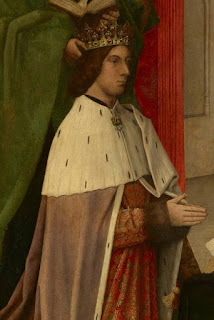 King James III of Scotland died at the Battle of Sauchieburn on June 11, 1488, fighting against Scottish rebels, including his son who would succeed him as King James IV of Scotland. One reason to highlight his death is his portrait in the Trinity Altarpiece painted by Hugo van der Goes, which is on display at the National Galleries Scotland on permanent loan from the Royal Collections:These panels formed part of one of the most important altarpieces ever painted for a Scottish chapel, and are thought to have been the wings of a triptych. The work was commissioned by Edward Bonkil, Provost of the Collegiate Chapel of the Holy Trinity in Edinburgh. (The chapel was demolished in 1848 to make way for Waverley Station.) The missing central panel possibly showed the Virgin and Child Enthroned, and may have been destroyed during the Reformation. When open, the wings show a devout King James III with his elder son and his queen Margaret of Denmark, accompanied by Saint Andrew and Saint George. The lion rampant on the king’s coat of arms is reversed in deference to the holy figures on the missing central panel. The closed wings feature a vision of the Holy Trinity appearing to the kneeling Edward Bonkil.
King James III of Scotland died at the Battle of Sauchieburn on June 11, 1488, fighting against Scottish rebels, including his son who would succeed him as King James IV of Scotland. One reason to highlight his death is his portrait in the Trinity Altarpiece painted by Hugo van der Goes, which is on display at the National Galleries Scotland on permanent loan from the Royal Collections:These panels formed part of one of the most important altarpieces ever painted for a Scottish chapel, and are thought to have been the wings of a triptych. The work was commissioned by Edward Bonkil, Provost of the Collegiate Chapel of the Holy Trinity in Edinburgh. (The chapel was demolished in 1848 to make way for Waverley Station.) The missing central panel possibly showed the Virgin and Child Enthroned, and may have been destroyed during the Reformation. When open, the wings show a devout King James III with his elder son and his queen Margaret of Denmark, accompanied by Saint Andrew and Saint George. The lion rampant on the king’s coat of arms is reversed in deference to the holy figures on the missing central panel. The closed wings feature a vision of the Holy Trinity appearing to the kneeling Edward Bonkil.You may see the entire panel including his portrait here. The image I'm displaying (Public Domain) is found here.
Note that his son James IV, who also died in battle (at the Battle of Flodden on September 9, 1513), repented of his participation in the death of his father and had Masses said for his soul. According to sources cited in James IV's Wikipedia article:
James IV bore intense guilt for the indirect role which he had played in the death of his father. He decided to do penance for his sin, constantly wearing an iron belt around his waist, next to the skin, to which he added weight every year throughout his life.[17][18]
James III was entombed in Cambuskenneth Abbey.
June 7, 2024
Newman and the Liturgy: From Withey to Lang and Velez
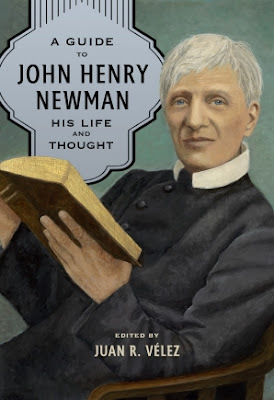 As noted recently, I'd dipped into Donald A. Withey's John Henry Newman: The Liturgy and the Breviary, Their Influence on His Life as an Anglican (London: Sheed & Ward, 1992), and used some information gleaned from it to comment on Newman's friendship with Isaac Williams. Then I finished the book and turned to Father Juan Velez's excellent survey of Newman's life and thought to read an essay on Newman and the liturgy there.Donald A. Withey, who served on the Committee for Pastoral Liturgy of the Bishop's Conference of England and Wales and other liturgical organizations, also wrote Why Receive the Chalice? (1990) and Catholic Worship: An Introduction to Liturgy (1990/2002), and edited Adult Initiation (1989).
As noted recently, I'd dipped into Donald A. Withey's John Henry Newman: The Liturgy and the Breviary, Their Influence on His Life as an Anglican (London: Sheed & Ward, 1992), and used some information gleaned from it to comment on Newman's friendship with Isaac Williams. Then I finished the book and turned to Father Juan Velez's excellent survey of Newman's life and thought to read an essay on Newman and the liturgy there.Donald A. Withey, who served on the Committee for Pastoral Liturgy of the Bishop's Conference of England and Wales and other liturgical organizations, also wrote Why Receive the Chalice? (1990) and Catholic Worship: An Introduction to Liturgy (1990/2002), and edited Adult Initiation (1989).In John Henry Newman: The Liturgy and the Breviary, Their Influence on His Life as an Anglican, he is focused on Newman's interests in the celebration of the prayers and liturgies of the Book of Common Prayer and his use of Roman (Catholic) Breviary and involvement in projects to translate and publish it for Anglican use. In chapter nine Withey considers Newman's conversion in light of his understanding of the liturgy and his use of Roman Breviary, especially in his Littlemore retreat while writing the Essay on the Development of Christian Doctrine.
The Table of Contents:
List of Illustrations AcknowledgementPreface
Part One: Newman, The Liturgy and the Roman BreviaryOne. BeginningsTwo. Newman and the LiturgyThree. Newman and the BreviaryFour. The Breviary Translation Project - Phase OneFive. The Breviary Translation Project - Phases Two and ThreeSix. The Sarum Breviary ProjectSeven. The Breviary Offices at LittlemoreEight. Newman's Writings on the Daily OfficeNine. Outcome: 'This is a Religion'
Part Two: Newman's TranslationsTen. Ten TranslationsEleven. Notes on the Translations
AppendicesOne. [Liturgical] Tracts for the TimesTwo. [List of] Newman's Sermons of Liturgical InterestThree. Newman's Two Prefaces to Hymnae Ecclesiae
NotesSelect BibliographyIndex
Withey quotes often from the letters between Newman and others working on the Roman Breviary translation project one through three; he had access to the Birmingham Oratory Archives in the days when not all of Newman's letters and diaries were available in print.
The Tractarian interest in the liturgy of the Book of Common Prayer began with lectures by Charles Lloyd, Regius Professor of Theology and later Bishop of Oxford. In 1825 he published Formularies of Faith Put Forth by Authority during the Reign of Henry VIII. Newman had attended his private lectures and after Bishop Lloyd died on May 31, 1829, Newman wrote to his sister Harriet (6/4/1829):
I had the greatest esteem, respect, and love for him as a most warm-hearted, frank, vigorous-minded and generous man. His kindness for me I cannot soon forget. He brought me forward, made me known, spoke well of me, and gave me confidence in myself. I have before my mind various pictures of what passed in his lecture-room; how he used to fix his eyes on me when he was pleased, and never put his Ch. Ch. friends unduly forward. I wish he ever had been aware how much I felt his kindness. [Letters and Correspondence: 1827-1829]
The other great influence on the Tractarians regarding liturgy was Origines Liturgicæ by William Palmer of Worcester College (not the William Palmer of Magdalen College).
Newman restored elements of the Prayer Book liturgy at both St. Mary's in Oxford and St. Mary's-St. Nicholas' in Littlemore, including Morning and Evening Prayer read aloud in church and Sunday Communion services. Withey also credits Newman with "introducing the nineteenth century Church of England to office hymns" (p. 91)
In the chapter on the Sarum Breviary translation project I learned that:
Perhaps the last chapter was the best: "Outcome: 'This is a Religion", in which Withey traces the three phases of Newman's progress to the Catholic Church and the "part played by his understanding of the Liturgy, and especially by his encounter with the Roman Breviary." (p. 102)
Because of the conditions in sixteenth century England [that is, Recusancy, Penal Laws, Martyrdoms, etc], no attempt was made by Roman Catholics to secure the continued use of the Sarum Breviary under the provisions of the the Bull Quod a nobis, which allowed for missals and breviaries with at least two hundred years of continuous use to be continued to be used. (p. 68)
According to Withey's schema the first phase was "his search for the identity of the Church of England." (p. 102) At that time he believed that the Church of England was a part of the Church Catholic, one, holy, and apostolic (Credo!) as the Via Media. The second phase, through his study of the Fathers of the Church and the Anglican divines revealed to him that it might not be that Via Media at all--the Monophysite heresy and Wiseman's Dublin Review article, with the echoing refrain "securus judicat orbis terrarum"--contributed to those doubts. And third, when Newman began to test the Roman Catholic Church's claim to be that Church Catholic he sought: that's when studying Saint Athanasius and the Arian heresy mirrored what he'd found in his study of the Monophysite heresy: Rome was the One upholding the true doctrine of the Incarnation! (pp 104-105)
And the role of the liturgy--although barely mentioned in the Development of Doctrine--was that, according to Withey, Newman saw the Church "as an integrated body, made up of interrelated elements, one of the most important of which was the sacramental principle" (p. 107). In some ways, Withey anticipates some of Father Ian Ker's argument in Newman on Vatican II (OUP: 2014), but in such compressed form that it can compare with Father Ker's analysis.
Once Newman--as Chesterton would later say--started looking at the Catholic Church from the inside through the Roman Breviary and being fair to the Catholic Church by studying the Fathers of the Church and their times, he came to assent to the Truth and to become a member of the "one true fold of Christ".
I appreciated Dr. Withey's detail and narration and would recommend this book to those interested in this aspect of Newman's life.
Turning to chapter 21 in A Guide to John Henry Newman His Life and Thought , (which is now available in paperback!) "From the Book of Common Prayer to the Sacrifice of the Mass and the Roman Breviary by Father Uwe Michael Lang (of the London Oratory) and Father Juan R. Velez (of Opus Dei and the editor of the book), here are the chapter headings:
Anglican Liturgy in the Early Nineteenth Century --Important for context and the most essential liturgical ideas in Cranmer's Book of Common Prayer: there is no Sacrifice re-represented in the Communion Service and the rejection of Transubstantiation
Newman: From Evangelical to Anglo-Catholic Views --Highlights Newman's "understanding of the Mass as a sacrifice. For Newman, it became evident that the altar (thusiasterion) for the early Christians implied a sacrifice (prosphora) and sacrifice implied priesthood." (p. 379)
Newman and the Tractarians: Underlying Principles --Includes this discussion of the Ritualism movement in the later stages of the Tractarian movement (see John Shelton Reed's Glorious Battle: The Cultural Politics of Victorian Anglo-Catholicism from Vanderbilt University Press)
Newman at Littlemore and Rediscovering Catholic Tradition --Not much added to Withey's discussion of Littlemore and the Roman Breviary, etc
Newman as a Catholic Priest --Notes Newman's comfort in the Eucharistic Presence of Christ in the Tabernacle; mentions Newman's aims in building Our Lady Seat of Wisdom for the Catholic University of Ireland in Dublin, its Byzantine/Romanesque style.
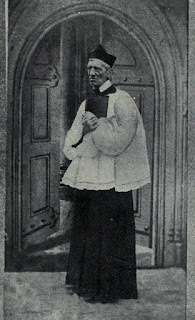 Catholic Sense of the Liturgy Cites Alcuin Reid's The Organic Development of the Liturgy's two pages (pp 67-69) on Newman as exceptional; otherwise comments on Romano Guardini's Spirit of the Liturgy (not much Newman)
Catholic Sense of the Liturgy Cites Alcuin Reid's The Organic Development of the Liturgy's two pages (pp 67-69) on Newman as exceptional; otherwise comments on Romano Guardini's Spirit of the Liturgy (not much Newman)Conclusion --"Once he became Catholic, he truly found peace and serenity in the liturgy, even in the midst of severe external trials, and his prayerful dedication to the Church's divine worship made his priestly life exemplary." (p. 397)
Suggested Reading
Fathers Lang and Velez highlight Withey's book as the only monograph study on Newman and the Liturgy and note that neither the Oxford nor Cambridge guides to Newman contain essays on that subject and in fact, there are few studies of Newman and the Liturgy. One they do not mention is here by Father Guy Nichols of the Birmingham Oratory which highlights Newman's contributions to the liturgy at that church, architecturally and musically. Father Lang contributed this article to the Adoremus Bulletin.
There you have it: some notes on Newman and the Liturgy as an Anglican/Tractarian and as a Catholic/Oratorian priest.
June 6, 2024
Preview: Part One of Three: Newman's "The Greatness and Littleness of Human Life"
For the next three Mondays in June, I'll be on the Son Rise Morning Show (SRMS) with Anna Mitchell or Matt Swaim to explore this Parochial and Plain Sermon of St. John Henry Newman: "The Greatness and Littleness of Human Life".
The Newman sermon reading group I attend at our local IHM Convent read and discussed this sermon not too long ago. It is beautifully composed sermon, filled with human sympathy and significance and deserves more attention than a single five or six minute segment! I encourage you to read it through because I will be excerpting passages for each segment on June 10, 17, and 24.
So I'll be on the air at my usual time (about 6:50 a.m. Central/7:50 a.m. Eastern) Monday, June 10 to start our discussion: please listen live here or catch the podcast later here. And remember, if you subscribe to the SRMS email, you'll get a reminder every morning of who is on, discussing what!
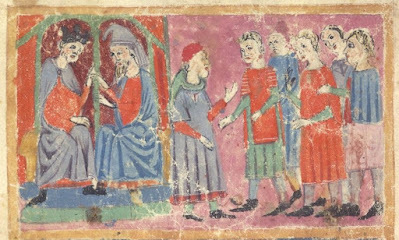
Newman takes as his verse Jacob's answer to Pharaoh's question ("And being asked by him: How many are the days of the years of thy life?" Genesis 47:8) in Egypt:
"The days of my pilgrimage are a hundred and thirty years, few, and evil, and they are not come up to the days of the pilgrimage of my fathers." (Genesis 47:9) (Image Credit (Public Domain): Joseph and his brothers, Jacob in front of Pharaoh. From the Haggadah for Passover (the 'Sister Haggadah'))
[If you need to, you could refresh your memory of Jacob/Israel's life with this article from the Catholic Encyclopedia!]
First, Newman contrasts Jacob's answer to the circumstances of his life, which had been long and blessed in many ways:
{214} WHY did the aged Patriarch call his days few, who had lived twice as long as men now live, when he spoke? why did he call them evil, seeing he had on the whole lived in riches and honour, and, what is more, in God's favour? yet he described his time as short, his days as evil, and his life as but a pilgrimage. Or if we allow that his afflictions were such as to make him reasonably think cheaply of his life, in spite of the blessings which attended it, yet that he should call it short, considering he had so much more time for the highest purposes of his being than we have, is at first sight surprising. He alludes indeed to the longer life which had been granted to his fathers, and perhaps felt a decrepitude greater than theirs had been; yet this difference between him and them could hardly be the real ground of his complaint in the text, or more than a confirmation or occasion of it. It was not because Abraham had lived one {215} hundred and seventy-five years, and Isaac one hundred and eighty, and he himself, whose life was not yet finished, but one hundred and thirty, that he made this mournful speech. For it matters not, when time is gone, what length it has been; and this doubtless was the real cause why the Patriarch spoke as he did, not because his life was shorter than his fathers', but because it was well nigh over. When life is past, it is all one whether it has lasted two hundred years or fifty. And it is this characteristic, stamped on human life in the day of its birth, viz. that it is mortal, which makes it under all circumstances and in every form equally feeble and despicable. All the points in which men differ, health and strength, high or low estate, happiness or misery, vanish before this common lot, mortality. Pass a few years, and the longest-lived will be gone; nor will what is past profit him then, except in its consequences. . . .
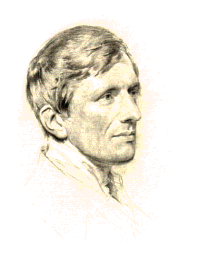 Newman then focuses on how we view an individual human life in the context of experience and memory, as we see in someone's life the promise it held and the balance of failure and success in that promise's fulfillment:
Newman then focuses on how we view an individual human life in the context of experience and memory, as we see in someone's life the promise it held and the balance of failure and success in that promise's fulfillment:. . . This is what we all feel, though at first sight it seems a contradiction, that even though the days as they go be slow, and be laden with many events, or with sorrows or dreariness, lengthening them out and making them tedious, yet the year passes quick though the hours tarry, and time bygone is as a dream, though we thought it would never go while it was going. And the reason seems to be this; that, when we contemplate human life in itself, in however small a portion of it, we see implied in it the presence of a soul, {216} the energy of a spiritual existence, of an accountable being; consciousness tells us this concerning it every moment. But when we look back on it in memory, we view it but externally, as a mere lapse of time, as a mere earthly history. And the longest duration of this external world is as dust and weighs nothing, against one moment's life of the world within. Thus we are ever expecting great things from life, from our internal consciousness every moment of our having souls; and we are ever being disappointed, on considering what we have gained from time past, and can hope from time to come. And life is ever promising and never fulfilling; and hence, however long it be, our days are few and evil. This is the particular view of the subject on which I shall now dwell.
Because we believe and know each person we meet and admire in some way has an immortal soul, we begin, Newman suggests, to see the difference between their lives on earth and the life to come. Even though there have been disappointments and sorrows in their lives, there must be more; it cannot be that a Good God created them for nothing:
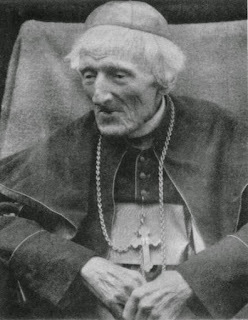 Our earthly life then gives promise of what it does not accomplish. It promises immortality, yet it is mortal; it contains life in death and eternity in time; and it attracts us by beginnings which faith alone brings to an end. I mean, when we take into account the powers with which our souls are gifted as Christians, the very consciousness of these fills us with a certainty that they must last beyond this life; that is in the case of good and holy men, whose present state I say, is to them who know them well, an earnest of immortality. The greatness of their gifts, contrasted with their scanty time for exercising them, forces the mind forward to the thought of another life, as almost the necessary counterpart and consequence of this life, and certainly implied in this life, provided there be a righteous Governor of the world, who does not make man for nought. {217}
Our earthly life then gives promise of what it does not accomplish. It promises immortality, yet it is mortal; it contains life in death and eternity in time; and it attracts us by beginnings which faith alone brings to an end. I mean, when we take into account the powers with which our souls are gifted as Christians, the very consciousness of these fills us with a certainty that they must last beyond this life; that is in the case of good and holy men, whose present state I say, is to them who know them well, an earnest of immortality. The greatness of their gifts, contrasted with their scanty time for exercising them, forces the mind forward to the thought of another life, as almost the necessary counterpart and consequence of this life, and certainly implied in this life, provided there be a righteous Governor of the world, who does not make man for nought. {217}We'll end with this selection on Monday, June 10, in which Newman has laid out the puzzle, the difficulty we see in our lives and every human life--although he does not doubt the value of each life, nor God's purposes for our happiness through Him, with Him, and in Him!
Newman explores these issues of greatness and littleness of human life further in the next paragraphs (our June 17 episode) and then of course applies those lessons to us in the course of our lives now (our June 24 episode).
I chose two portraits of Newman to bracket this first section, one as a handsome young man and one as an old Cardinal: he lived a long life (1801 to 1890, 89 years and six months!).
Sacred Heart of Jesus, have mercy on us!
Saint Jacob, pray for us!Saint John Henry Newman, pray for us!
June 3, 2024
Another Tractarian: Isaac Williams and Saint John Henry Newman
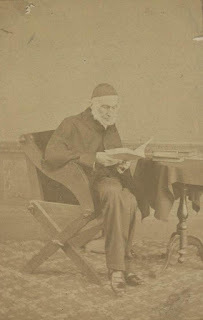 The Newman Review of the National Institute of Newman Studies highlights Saint John Henry Newman's Tractarian friendship with Isaac Williams. According to Lawrence Gregory:The Rev. Isaac Williams (1802–1865) was a contemporary of John Henry Newman (1801–1890) at Trinity College, Oxford. The son of a Welsh lawyer, he was ordained a priest in Anglican Orders in 1829, serving first as curate at Windrush, Gloucestershire. Williams returned to Oxford in 1831 after being elected a Fellow and Tutor at Trinity and became the Dean of his College in 1833 and vice-president in 1841. From 1836 he also served as assistant curate to Newman at Littlemore.
The Newman Review of the National Institute of Newman Studies highlights Saint John Henry Newman's Tractarian friendship with Isaac Williams. According to Lawrence Gregory:The Rev. Isaac Williams (1802–1865) was a contemporary of John Henry Newman (1801–1890) at Trinity College, Oxford. The son of a Welsh lawyer, he was ordained a priest in Anglican Orders in 1829, serving first as curate at Windrush, Gloucestershire. Williams returned to Oxford in 1831 after being elected a Fellow and Tutor at Trinity and became the Dean of his College in 1833 and vice-president in 1841. From 1836 he also served as assistant curate to Newman at Littlemore.
He collaborated on the Lyra Apostolica and as a Tractarian and contributed Tract 80, “On Reserve in Communicating, Religious Knowledge,” which he concluded with Tract 87. Williams also wrote Tract 86 “Indications of a superintending Providence in the preservation of the Prayer-book and in the changes which it has undergone.”
The controversy about Tract 90 meant that Williams did not succeed John Keble as Professor of Poetry as expected. In 1842, he left St. Mary's in Oxford and Littlemore, married Caroline Champernowne and the couple moved to Bisley, Gloucestershire, where he worked as a curate to Thomas Keble, John's brother. Williams became very ill in 1846 and was not able to continue in parish work. He and his wife to moved to Stinchcombe, Gloucestershire, where his sister Jane and her husband, Sir George Prevost, another Tractarian, held the living.
In John Henry Newman: The Liturgy and the Breviary, Their Influence on His Life as an Anglican (Sheed & Ward: 1992), Donald A. Withey suggests that Newman and Williams did not always agree--even though they were good friends and remained friends, even after Newman became a Catholic--on certain projects members of the Oxford Movement were undertaking. For example, in 1838, Samuel Wood and Robert Williams, two laymen, became interested in translating, printing, and selling the Roman [Catholic] Breviary. Richard Hurrell Froude had begun praying it and others in the Movement bought copies when they were on the Continent, etc. Wood and Robert Williams were financing the project with their own money, and were asking Newman, Isaac Williams, and others to translate hymns, etc.
Opposition to the project, which kept starting and stopping, Withey says was largely aimed at Newman and "was led by Tom Keble, Isaac Williams, and George Prevost. Tom Keble and Newman disagreed about the significance of the reformers of the sixteenth century . . . " (p. 33) Isaac, Withey notes, "admired and enjoyed a close friendship with [Newman]. However, he also had a long-standing loyalty to the Kebles dating from his undergraduate days." Withey suggests that Isaac sided with Tom Keble "against Newman" -- who was also rather diffident about the project because of the cost and the care of omitting things that were just "too" Catholic--because of any "Romanizing influence". (p. 34)
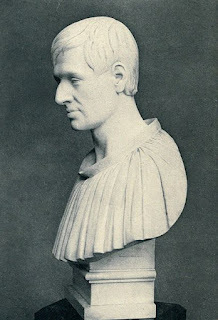 Reading about these efforts to translate and print the four volumes of the Roman Breviary in Chapter Four, "The Breviary Translation Project - Phase One" reminded me of how delicately the Tractarians had to proceed in their overall project to demonstrate the Apostolic basis of the Church of England. They were always walking a fine line--one step too far and they would be accused of Popery and being secretly Papist while holding Church of England benefices, offices, and livings!
Reading about these efforts to translate and print the four volumes of the Roman Breviary in Chapter Four, "The Breviary Translation Project - Phase One" reminded me of how delicately the Tractarians had to proceed in their overall project to demonstrate the Apostolic basis of the Church of England. They were always walking a fine line--one step too far and they would be accused of Popery and being secretly Papist while holding Church of England benefices, offices, and livings!In the next chapter, "The Breviary Translation Project - Phases Two and Three", Withey describes Isaac Williams' reactions when E.B. Pusey took up the reins of the effort in 1843. At first Isaac seemed helpful and willing to let Pusey use his translations, but because "he was then moving away from his High Church convictions towards a Low Church stance"*, working with him became more difficult. He "vacillated considerably and awkwardly before making up his mind to allow the use of the manuscripts" (pp. 58-59)
*[Note that Withey doesn't provide any evidence of Williams' change of mind in the book and I haven't researched that aspect at all. Also note: there is no good image of the cover of Withey's book which is out of print but available. Pages 168-169 in the Notes has some particularly interesting detail about how Latin was pronounced in England in Newman's time! Sister Florella, who taught me Latin at Kapaun-Mount Carmel High School always reminded us that there weren't any "tapes" of Romans speaking Latin in the Vatican archives!]
One reason Newman himself was reluctant to see the project completed was since he had obtained the late Richard Hurrell Froude's copy of the Roman Breviary in 1836, he had been praying it daily, and it was influencing him toward "Roman Catholic" piety and prayer. Even though he tried to skip certain prayers to the Blessed Virgin Mary and the saints, it was becoming attractive to him.
Isaac Williams and Newman maintained their friendship after Newman followed that attraction with assent and conversion in 1845. As Gregory notes in the Newman Review article:
The NINS Digital Collections contain 26 letters by Williams. Three are from the papers of Hurrell Froude, and 23 make up his surviving correspondence with Newman. The Newman letters begin in March 1841 at the time of the Tract 90 controversy and continue until May 1864, a few months before Williams’s death. Those from the 1840s cover discussions about the growing schism at Oxford, while those from the 1850s and 60s are of a more personal nature . . .
You may find links to articles about and works of Isaac Williams at Project Canterbury.
Image Credit (Public Domain): A portrait from the Welsh Portrait Collection at the National Library of Wales. Depicted person: Isaac Williams – Welsh writer
May 31, 2024
What I'm Reading Now: "The Catholic Reformation" by Pierre Janelle
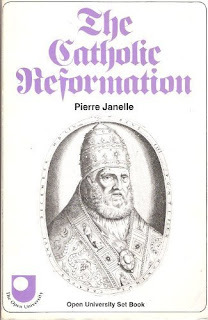 I've just started this book which purports, according to the publisher's blurb (The Bruce Company of Milwaukee) to offer a different interpretation of Church history in the fifteenth through seventeenth centuries:
I've just started this book which purports, according to the publisher's blurb (The Bruce Company of Milwaukee) to offer a different interpretation of Church history in the fifteenth through seventeenth centuries:"The Catholic Reformation began before the Protestant Revolt as a continuation of the Christian humanism movement of the late fifteenth century. It not only amended the discipline of the Church, but exerted its influence in every field of human endeavour."
This is the thesis of Dr. Janelle's book in which he corrects the world's generally mistaken impression that Catholic Reform, commonly termed the Counter-Reformation, was a consequence of and reaction against the Protestant Reformation. Analyzing the historical movement in all its aspects, he presents the first work on this subject ever published in English. . . .
I have the 1963 paperback edition. The Table of Contents:
Anarchy the Disease Within the Church -- Early Reactions against Disease in the Church -- Reformation Again Delayed -- Preparing for Trent -- The Council of Trent -- The Religious Revival among the Regulars -- Education and Scholarship -- The Catholic Reformation and Literature -- The Catholic Reformation and Art -- Piety and Mysticism -- The Catholic Reformation after Trent -- The Catholic Reformation in France -- The Catholic Reformation in Great Britain and Ireland -- The Missions
Here's some information about the author, whose books are out of print and hard to find:
Pierre Janelle was born on the 17th of September in 1891 in the village of Mouy in the French region of Oise. His father, Ernest Janelle, was a headmaster at several secondary schools in Paris including Lycée Charlemagne and Lycée Pasteur.Pierre studied at the Sorbonne where he graduated in 1911 as an English academic. Between 1925 and 1928 he was also the holder of the Ernest Lavisse research scholarship awarded to him by the Sorbonne. In 1935 he obtained a D.Litt degree at the same university. . .
As well as being an English Professor, Janelle wrote many influential books on religious history particularly surrounding the British Isles. Some of his books which can be found in the university library include Obedience in Church and State (1930) and The Catholic Reformation (1949). John Swinnerton Philimore an English Catholic covert [sic]*who was a professor of Glasgow University greatly influenced Janelle's interest in Britain's Catholic history and lent him many rare books so that he could carry out his research. Janelle also appeared as a guest speaker for the BBC in July 1948 to discuss his research on the religious history of Britain.
* [a covert convert?]
I'd really love to find a copy of this book: Robert Southwell, The Writer: A Study in Religious Inspiration, published by Sheed & Ward!
To conclude the author's Roll of Honour entry at the University of Glasgow:
Pierre Janelle died on 19th March 1964. He is remembered for his gallant military actions in the First and Second World War as well as his notable contributions to education and religious historical research.
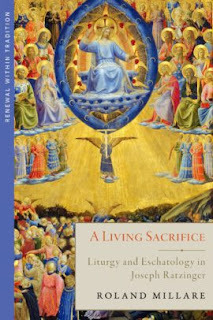 I'm also reading Roland Millare's
A Living Sacrifice: Liturgy and Eschatology in Joseph Ratzinger
, which I purchased at Eighth Day Books last year in January (!) when the author was visiting Wichita:
I'm also reading Roland Millare's
A Living Sacrifice: Liturgy and Eschatology in Joseph Ratzinger
, which I purchased at Eighth Day Books last year in January (!) when the author was visiting Wichita:A Living Sacrifice focuses on the inherent relationship between eschatology and the liturgy in light of Ratzinger’s insistence upon the primacy of logos over ethos. When logos is subordinated to ethos, the human person becomes subjected to a materialist ontology that leads to an ethos that is concerned above all by utility and progress, which affects one’s approach to understanding the liturgy and eschatology. How a person celebrates the liturgy becomes subject to the individual whim of one person or a group of people. Eschatology is reduced to addressing the temporal needs of a society guided by a narrow conception of hope or political theology. If the human person wants to understand his authentic sacramental logos, then he must first turn to Christ the incarnate Logos, who reveals to him that he is created for a loving relationship with God and others.
The primacy of logos is the central hermeneutical key to understanding the unique vision of Ratzinger’s Christocentric liturgical theology and eschatology. This is coupled with a study of Ratzinger’s spiritual Christology with a focus on how it influences his theology of liturgy and eschatology through the notions of participation and communion in Christ’s sacrificial love. Finally, A Living Sacrifice examines Ratzinger’s theology of hope, charity, and beauty, as well as his understanding of active participation in relationship to the eschatological and cosmic characteristics of the sacred liturgy.
It's a good follow up to re-reading and discussing the chapters on the Resurrection and Ascension in Pope Benedict XVI's Jesus of Nazareth: Part Two: Holy Week from the Entrance into Jerusalem to the Resurrection with my best friend after Easter!May 30, 2024
Preview: Newman on the Holy Spirit and the "Our Father"
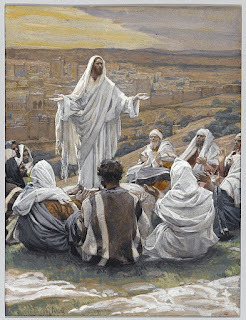 On Monday, May 20, I mentioned that Saint John Henry Newman in his sermon "The Indwelling Spirit" had included an analysis of how the Holy Spirit inspires us to pray the Our Father (The Lord's Prayer), as the model Jesus taught His Apostles in the Gospel according to St. Matthew. Anna Mitchell asked me to explain this further on the Son Rise Morning Show on another broadcast.
On Monday, May 20, I mentioned that Saint John Henry Newman in his sermon "The Indwelling Spirit" had included an analysis of how the Holy Spirit inspires us to pray the Our Father (The Lord's Prayer), as the model Jesus taught His Apostles in the Gospel according to St. Matthew. Anna Mitchell asked me to explain this further on the Son Rise Morning Show on another broadcast.Since Monday, May 27 was Memorial Day and they ran a "Best of the Son Rise Morning Show" program, I'll be on the Son Rise Morning Show to cover this passage on Monday, June 3 at my usual time, about 6:50 a.m. Central/7:50 a.m. Eastern. Please listen live here or listen to the podcast later.
Newman's exposition on how the Holy Spirit helps us pray "The Our Father" occurs in the section on how the Holy Spirit helps us relate to Our Father:
Being then the sons of God, and one with Him, our souls mount up and cry to Him continually. This special characteristic of the regenerate soul is spoken of by St. Paul soon after the text. "Ye have received the Spirit of adoption, whereby we cry, Abba, Father." Nor are we left to utter these cries to Him, in any vague uncertain way of our own; but He who sent the Spirit to dwell in us habitually, gave us also a form of words to sanctify the separate acts of our minds. Christ left His sacred Prayer to be the peculiar possession of His people, and the voice of the Spirit. If we examine it, we shall find in it the substance of that doctrine, to which St. Paul has given a name in the passage just quoted.So the Holy Spirit helps us pray to the Father as the Son taught us, not just saying the words but reflecting upon their meaning:
Our Father:
We begin it by using our privilege of calling on Almighty God in express words as "Our Father."Who art in Heaven; Hallowed be Thy Name; Thy Kingdom Come; Thy Will be Done on Earth as it is in Heaven:
We proceed, according to this beginning, in that waiting, trusting, adoring, resigned temper, which children ought to feel; looking towards Him, rather than thinking of ourselves; zealous for His honour rather than fearful about our safety;Give us this day our daily bread:
And forgive us our trespasses as we forgive those who trespass against us.And lead us not into temptation but deliver us from evil:
resting in His present help, not with eyes timorously glancing towards the future.
His name, His kingdom, His will, are the {226} great objects for the Christian to contemplate and make his portion, being stable and serene, and "complete in Him," as beseems one who has the gracious presence of His Spirit within him.
And, when he goes on to think of himself, he prays, that he may be enabled to have towards others what God has shown towards himself, a spirit of forgiveness and loving-kindness. Thus he pours himself out on all sides, first looking up to catch the heavenly gift, but, when he gains it, not keeping it to himself, but diffusing "rivers of living water" to the whole race of man, thinking of self as little as may be, and desiring ill and destruction to nothing but that principle of temptation and evil, which is rebellion against God;
And from some later manuscripts, as used in the Book of Common Prayer:
For thine is the kingdom, and the power, and the glory, forever. Amen.
—lastly, ending, as he began, with the contemplation of His kingdom, power, and glory ever-lasting.
In his final remarks about how the Holy Spirit inspires the Christian to pray the Lord's Prayer well to the Father, Newman advises her to silence and contemplation instead of sharing some special favors she thinks she may have received:
This is the true "Abba, Father," which the Spirit of adoption utters within the Christian's heart, the infallible voice of Him who "maketh intercession for the Saints in God's way."
And if he has at times, for instance, amid trial or affliction, special visitations and comfortings from the Spirit, "plaints unutterable" within him, yearnings after the life to come, or bright and passing gleams of God's eternal election, and deep stirrings of wonder and thankfulness thence following, he thinks too reverently of "the secret of the Lord," to betray (as it were) His confidence, and, by vaunting it to the world, to exaggerate it perchance into more than it was meant to convey: but he is silent, and ponders it as choice encouragement to his soul, meaning something, but he knows not how much.
This discernment and care about responding to graces received--especially with "vaunting them to the world"--I think is reinforced by Newman's exhortation at the end of the sermon:
Thoughts, such as these, will affect us rightly, if they make us fear and be watchful, while we rejoice. They cannot surely do otherwise; for the mind of a Christian, as I have been attempting to describe it, is not so much what we have, as what we ought to have. . . . It is our concern only to look to ourselves, and to see that, as we have received the gift, we "grieve not the Holy Spirit of God, whereby we are sealed unto the day of redemption;" remembering that "if any man destroy the temple of God, him shall God destroy."Instead of exaggerating the spiritual or moral privileges we may have received through the Grace of God in the inspiration of the Holy Spirit, we should respond with humility and fear of the Lord:
We need to know how we have failed to respond to the promptings of the Holy Spirit to live out the "light and grace of our Baptism", so we may respond appropriately to any suffering that comes:
This reflection and the recollection of our many backslidings, will ever keep us, please God, from judging others, or from priding ourselves on our privileges. Let us but consider how we have fallen from the light and grace of our Baptism. Were we now what that Holy Sacrament made us, we might ever ''go on our way rejoicing;" but having sullied our heavenly garments, in one way or other, in a greater or less degree (God knoweth! and our own consciences too in a measure), alas! the Spirit of adoption has in part receded from us, and the sense of guilt, remorse, sorrow, and penitence must take His place.
We must renew our confession, and seek afresh our absolution day by day, before we dare call upon God as "our Father," or offer up Psalms and Intercessions to Him. And, whatever pain and affliction meets us through life, we must take it as a merciful penance imposed by a Father upon erring children, to be borne meekly and thankfully, and as intended to remind us of the weight of that infinitely greater punishment, which was our desert by nature, and which Christ bore for us on the Cross.Saint John Henry Newman, pray for us!
Image Source (Public Domain): "The Lord's Prayer" by James Tissot
May 28, 2024
Happy 150th Birthday to G.K. Chesterton!
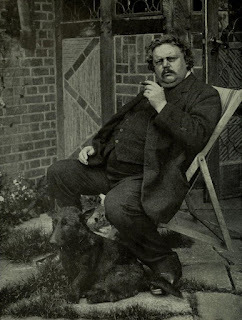 Only G.K. Chesterton could make such an event as his birth an excuse for levity, with deeper intent than at first perceived:Bowing down in blind credulity, as is my custom, before mere authority and the tradition of the elders, superstitiously swallowing a story I could not test at the time by experiment or private judgment, I am firmly of opinion that I was born on the 29th of May, 1874, on Campden Hill, Kensington; and baptised according to the formularies of the Church of England in the little church of St. George opposite the large Waterworks Tower that dominated that ridge. I do not allege any significance in the relation of the two buildings; and I indignantly deny that the church was chosen because it needed the whole water-power of West London to turn me into a Christian.
Only G.K. Chesterton could make such an event as his birth an excuse for levity, with deeper intent than at first perceived:Bowing down in blind credulity, as is my custom, before mere authority and the tradition of the elders, superstitiously swallowing a story I could not test at the time by experiment or private judgment, I am firmly of opinion that I was born on the 29th of May, 1874, on Campden Hill, Kensington; and baptised according to the formularies of the Church of England in the little church of St. George opposite the large Waterworks Tower that dominated that ridge. I do not allege any significance in the relation of the two buildings; and I indignantly deny that the church was chosen because it needed the whole water-power of West London to turn me into a Christian.Nevertheless, the great Waterworks Tower was destined to play its part in my life, as I shall narrate on a subsequent page; but that story is connected with my own experiences, whereas my birth (as I have said) is an incident which I accept, like some poor ignorant peasant, only because it has been handed down to me by oral tradition. And before we come to any of my own experiences, it will be well to devote this brief chapter to a few of the other facts of my family and environment which I hold equally precariously on mere hearsay evidence. Of course what many call hearsay evidence, or what I call human evidence, might be questioned in theory, as in the Baconian controversy or a good deal of the Higher Criticism. The story of my birth might be untrue. I might be the long-lost heir of The Holy Roman Empire, or an infant left by ruffians from Limehouse on a door-step in Kensington, to develop in later life a hideous criminal heredity. Some of the sceptical methods applied to the world's origin might be applied to my origin, and a grave and earnest enquirer come to the conclusion that I was never born at all. But I prefer to believe that common sense is something that my readers and I have in common; and that they will have patience with a dull summary of the facts.
from his Autobiography . He has received and accepts on faith the history of his birth, as have nearly all of us. Please note that Chesterton finished his Autobiography just before he died and it was published posthumously.
He also wrote about birthdays:
The first fact about the celebration of a birthday is that it is a way of affirming defiantly, and even flamboyantly, that it is a good thing to be alive….But there is a second fact about Birthdays, and the birth-song of all creation, a fact which really follows on this; but which, as it seems to me, the other school of thought almost refuses to recognize. The point of that fact is simply that it is a fact. In being glad about my Birthday, I am being glad about something which I did not myself bring about.
--from G.K.’s Weekly, 21 March 1935
Our local Chesterton society is meeting extraordinarily tonight (6 pm) at Eighth Day Books to celebrate his birthday by buying books and then repairing to a local ice cream shop -- not a pub? -- for a treat!
Happy Chesterton's Birthday to all his fans!
Image Credit (Public Domain): Picture of Chesterton with a Dog
May 25, 2024
Good News in Wichita: Four Newly Ordained Priests and Three Deacons!
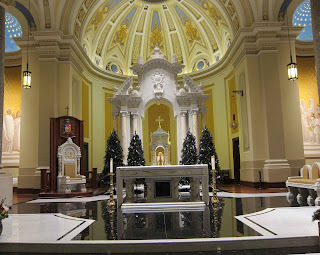
Two years ago I attended the last Ordination Mass for priests in our diocese; last year we had four transitional Deacons ordained, but no priests. This year: four priests and three deacons; so next year, God willing, Bishop Kemme will ordain three more priests! I'm not sure if there will be ordinations to the diaconate next May.
I did not attend this year's Ordination Mass but it was an spiritually emotional event two years ago for me, particularly when Bishop Kemme thanked the parents of the priests. I watched this year's Mass on-line, live streamed from the Cathedral of the Immaculate Conception.
The deacons were ordained on Thursday, May 23, the anniversary of Servant of God Emil J. Kapaun's death!
The Gospel for the Mass described Jesus sending the 72 disciples out like lambs among wolves to prepare different towns for His future visits, and Bishop Kemme did pick up on that line briefly in his homily.
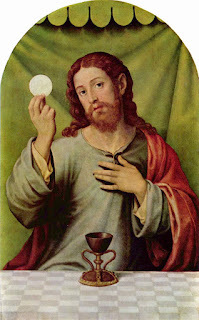 When I heard that passage, I could not help but think of the recent news story about the priest who had to protect the Blessed Sacrament from desecration in Florida last Sunday:Police in St. Cloud, Florida, have charged [Father Fidel] Rodriguez with one count of battery stemming from the incident, which occurred during the noon Mass at St. Thomas Aquinas Church. . . .
When I heard that passage, I could not help but think of the recent news story about the priest who had to protect the Blessed Sacrament from desecration in Florida last Sunday:Police in St. Cloud, Florida, have charged [Father Fidel] Rodriguez with one count of battery stemming from the incident, which occurred during the noon Mass at St. Thomas Aquinas Church. . . .Fortunately, the Diocese of Orlando is backing Father Fidel (what an appropriate name for a priest so faithful to his vocation) completely:
“At that point, the woman forcefully placed her hand in the vessel and grabbed some sacred Communion hosts, crushing them. Having only one hand free, Father Rodriguez struggled to restrain the woman as she refused to let go of the hosts. When the woman pushed him and reacting to a perceived act of aggression, Father Rodriguez bit her hand so she would let go of the hosts she grabbed. The woman was immediately asked to leave,” the diocese said in a written statement.
“It should be noted Father Rodriguez had no prior knowledge of the woman’s background. Further, while the Diocese of Orlando does not condone physical altercations such as this, in good faith, Father Rodriguez was simply attempting to prevent an act of desecration of the holy Communion, which, as a priest, Father Rodriguez is bound by duty to protect,” the diocese said.
The statement continues:
“The full video and the police report show the woman initiated physical contact and acted inappropriately. The priest was trying to protect the holy Communion from this sacrilegious act.
“In the Catholic tradition, the Eucharist is considered ‘the source and summit’ of worship and faith. The act of participation in holy Communion therefore calls for a proper understanding, reverence, and devotion. It is not something a person can arbitrarily demand and is certainly not a mere ‘cookie’ as the complainant called it.”
Please pray for Father Fidel and for our four new priests, Reverend Fathers Jesus Banuelos, Matthew Cooke, Caleb Kuestersteffen and Miles Swigart and three transitional deacons, Grant Husling, Joseph Mick, and Nicholas Samsel, that the wolves may stay away from them!
From the USCCB, a prayer for priests.
From the Fatima prayers, reparation for the desecration of the Holy Eucharist:
O Most Holy Trinity, Father, Son and Holy Spirit, I adore Thee profoundly. I offer Thee the most precious Body, Blood, Soul and Divinity of Jesus Christ present in all the tabernacles of the world, in reparation for the outrages, sacrileges and indifferences by which He is offended. By the infinite merits of the Sacred Heart of Jesus and the Immaculate Heart of Mary I beg the conversion of poor sinners. Amen.
I took the picture at the top of the Cathedral sanctuary during Advent, I think!
May 22, 2024
The Season of Novenas: Starting with the Holy Spirit
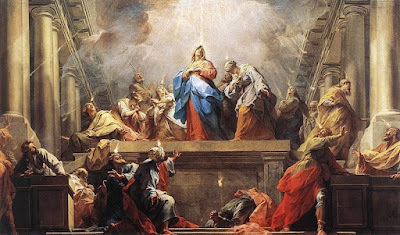
May and June seem to be prime Novena months. We start with the one Novena that the Catholic Church recommends to all for prayer: the Novena--nine days of prayer--between the Solemnity of the Ascension and Pentecost (Friday after Ascension Thursday to Saturday, the Vigil of Pentecost). EWTN's website describes the Novena to the Holy Spirit as:
. . . the prototype of all novenas. It commemorates the nine days between the Ascension of Our Lord and the descent of the Holy Spirit on the first Pentecost Sunday. During this time Our Lady and the twelve Apostles prayed in the upper room for the coming of the Paraclete.
After Pentecost, there are two other great Solemnities to prepare for: Corpus Christi (celebrated on Sunday, June 2) and the Sacred Heart of Jesus (celebrated on Friday, June 7), which will overlap. Add to that a Novena for Life, sponsored by the USCCB, leading up to the Feast of the Visitation: this is the season of Novenas indeed.
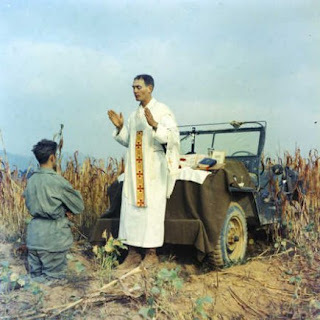 And in my diocese of Wichita, Kansas, we're encouraged to pray a Novena from June 1 to 9 "for Father Kapaun’s cause, that meetings this summer in Rome may see him named Venerable". On the website for the Novena, we're told the source for these days of prayer:While stationed in Japan before the outbreak of the Korean War, Chaplain Emil Kapaun gave a series of radio broadcasts based on the Eight Beatitudes to his troops. Two months later he and his men were sent to the defense of South Korea. Over the last year of his life, both on the front lines and facing inhumane captivity, Chaplain Kapaun’s actions showed his own deep understanding and fidelity to the Beatitudes. Aside from day one and a few additions, each of the reflections in this novena comes from these radio broadcasts.
And in my diocese of Wichita, Kansas, we're encouraged to pray a Novena from June 1 to 9 "for Father Kapaun’s cause, that meetings this summer in Rome may see him named Venerable". On the website for the Novena, we're told the source for these days of prayer:While stationed in Japan before the outbreak of the Korean War, Chaplain Emil Kapaun gave a series of radio broadcasts based on the Eight Beatitudes to his troops. Two months later he and his men were sent to the defense of South Korea. Over the last year of his life, both on the front lines and facing inhumane captivity, Chaplain Kapaun’s actions showed his own deep understanding and fidelity to the Beatitudes. Aside from day one and a few additions, each of the reflections in this novena comes from these radio broadcasts.A portion of the final two days of the broadcast were recorded on audio- the only surviving sound we have of Father Kapaun’s voice.
You may listen to Servant of God, Father Emil J. Kapaun's voice here.
There's also an update on the status of his cause. Today, May 23, is the anniversary of his death in 1951.
The practice of prayers for Nine Days or Nine Weeks, or Nine Months, of course, begins with the nine months between the Annunciation and the Nativity of Our Lord: from March 25 to December 25. There are also connections to prayers for the recently departed souls of loved ones. More on novenas here at the old Catholic Encyclopedia.
Corpus Christi, have mercy on us.
Sacred Heart of Jesus, have mercy on us.
Holy Mary, Mother of God, pray for us.
St. Elizabeth, pray for us.
St. John the Baptist, pray for us.
Servant of God, Emil J. Kapaun, pray for us.
Image source (Public Domain): Father Emil Kapaun celebrating Mass using the hood of a jeep as his altar, October 7, 1950
May 16, 2024
Preview: Newman's "The Indwelling Spirit" for Pentecost
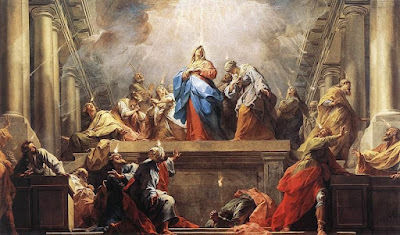
On Monday, May 20, we'll conclude our Easter Season Sermon Series on the Son Rise Morning Show with St. John Henry Newman's Pentecost reflections in "The Indwelling Spirit", number 19 in Volume Two of his Parochial and Plain Sermons, based on the verse "Ye are not in the flesh, but in the Spirit, if so be that the Spirit of God dwell in you." (Romans 8:9).
This is a long sermon, almost 4,300 words, filled with Trinitarian doctrine, and I've been most selective in what I'm previewing here. I'll be on the Son Rise Morning Show at my usual time, about 6:50 a.m. Central/7:50 a.m. Eastern. Please listen live here or listen to the podcast later.
In the three main sections of this sermon, Newman explains what the presence of the Holy Spirit in our souls, received in the Sacrament of Baptism through Regeneration and New Birth, means for our relationship to the Father, and to the Son, and to other men and women.
To the Father:
The heavenly gift of the Spirit fixes the eyes of our mind upon the Divine Author of our salvation. By nature we are blind and carnal; but the Holy Ghost by whom we are new-born, reveals to us the God of mercies, and bids us recognise and adore Him as our Father with a true heart. He impresses on us our Heavenly Father's image, which we lost when Adam {225} fell, and disposes us to seek His presence by the very instinct of our new nature. He gives us back a portion of that freedom in willing and doing, of that uprightness and innocence, in which Adam was created. He unites us to all holy beings, as before we had relationship with evil. He restores for us that broken bond, which, proceeding from above, connects together into one blessed family all that is anywhere holy and eternal, and separates it off from the rebel world which comes to nought. Being then the sons of God, and one with Him, our souls mount up and cry to Him continually.
To the Son:
The Spirit came especially to "glorify" Christ; and vouchsafes to be a shining light within the Church and the individual Christian, reflecting the Saviour of the world in all His perfections, all His offices, all His works. He came for the purpose of unfolding what was yet hidden, whilst Christ was on earth; and speaks on the house-tops what was delivered in closets, disclosing Him in the glories of His transfiguration, who once had no comeliness in His outward form, and was but a man of sorrows and acquainted with grief. First, He inspired the Holy Evangelists to record the life of Christ, and directed them which of His words and works to select, which to omit; next, He commented (as it were) upon these, and unfolded their meaning in the Apostolic Epistles. The birth, the life, the death and resurrection of Christ, has been the text which He has illuminated. He has made history to be doctrine; telling us plainly, whether by St. John or St. Paul, that Christ's conception and birth was the real Incarnation of the Eternal Word,—His life, "God manifest in the Flesh,"—His death and {228} resurrection, the Atonement for sin, and the Justification of all believers. Nor was this all: he continued His sacred comment in the formation of the Church, superintending and overruling its human instruments, and bringing out our Saviour's words and works, and the Apostles' illustrations of them, into acts of obedience and permanent Ordinances, by the ministry of Saints and Martyrs. Lastly, He completes His gracious work by conveying this system of Truth, thus varied and expanded, to the heart of each individual Christian in whom He dwells. Thus He vouchsafes to edify the whole man in faith and holiness: "casting down imaginations and every high thing that exalteth itself against the knowledge of God, and bringing into captivity every thought to the obedience of Christ." [2 Cor. x. 5.]
To our brothers and sisters:
What is fulness of joy but peace? Joy is tumultuous only when it is not full; but peace is the privilege of those who are "filled with the knowledge of the glory of the Lord, as the waters cover the sea." "Thou wilt keep him in perfect peace, whose mind is stayed on Thee, because he trusteth in Thee." [Isa. xxvi. 3.] It is peace, springing from trust and innocence, and then overflowing in love towards all around him. What is the effect of mere animal ease and enjoyment, but to make a man pleased with everything which happens? "A merry heart is a perpetual feast;" and such is peculiarly the blessing of a soul rejoicing in the faith and fear of God. He who is anxious, thinks of himself, is suspicious of danger, speaks hurriedly, and has no time for the interests of others; he who lives in peace is at leisure, wherever his lot is cast. Such is the work of the Holy Spirit in the heart, whether in Jew or Greek, bond or free. He Himself perchance in His mysterious nature, is the Eternal Love whereby the Father and the Son have dwelt in each other, as ancient writers have believed; and what He is in heaven, that {230} He is abundantly on earth. He lives in the Christian's heart, as the never-failing fount of charity, which is the very sweetness of the living waters. For where He is, "there is liberty" from the tyranny of sin, from the dread, which the natural man feels, of an offended, unreconciled Creator. Doubt, gloom, impatience have been expelled; joy in the Gospel has taken their place, the hope of heaven and the harmony of a pure heart, the triumph of self-mastery, sober thoughts, and a contented mind. How can charity towards all men fail to follow, being the mere affectionateness of innocence and peace? Thus the Spirit of God creates in us the simplicity and warmth of heart which children have, nay, rather the perfections of His heavenly hosts, high and low being joined together in His mysterious work; for what are implicit trust, ardent love, abiding purity, but the mind both of little children and of the adoring Seraphim!
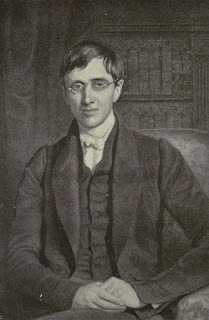 As always, Newman concludes his sermon with spiritual advice, exhorting us to avoid judging others but consider our own faults and failures (sins), repent, and bear our penances "meekly and thankfully":
As always, Newman concludes his sermon with spiritual advice, exhorting us to avoid judging others but consider our own faults and failures (sins), repent, and bear our penances "meekly and thankfully":This reflection and the recollection of our many backslidings, will ever keep us, please God, from judging others, or from priding ourselves on our privileges. Let us but consider how we have fallen from the light and grace of our Baptism. Were we now what that Holy Sacrament made us, we might ever ''go on our way rejoicing;" but having sullied our heavenly garments, in one way or other, in a greater or less degree (God knoweth! and our own consciences too in a measure), alas! the Spirit of adoption has in part receded from us, and the sense of guilt, remorse, sorrow, and penitence must take His place. We must renew our confession, and seek afresh our absolution day by day, before we dare call upon God as "our Father," or offer up Psalms and Intercessions to Him. And, whatever pain and affliction meets us through life, we must take it as a merciful penance imposed by a Father upon erring children, to be borne meekly and thankfully, and as intended to remind us of the weight of that infinitely greater punishment, which was our desert by nature, and which Christ bore for us on the Cross.
Saint John Henry Newman, pray for us!



